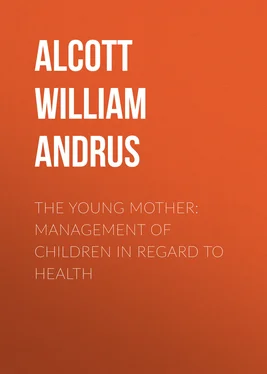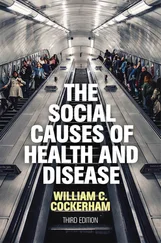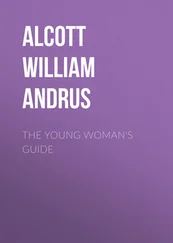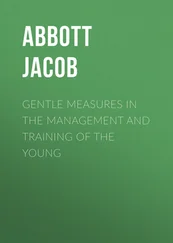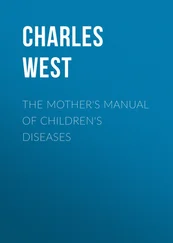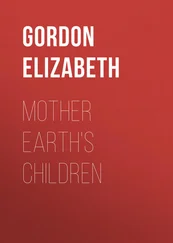William Alcott - The Young Mother - Management of Children in Regard to Health
Здесь есть возможность читать онлайн «William Alcott - The Young Mother - Management of Children in Regard to Health» — ознакомительный отрывок электронной книги совершенно бесплатно, а после прочтения отрывка купить полную версию. В некоторых случаях можно слушать аудио, скачать через торрент в формате fb2 и присутствует краткое содержание. Жанр: popular_business, upbringing_book, foreign_edu, на английском языке. Описание произведения, (предисловие) а так же отзывы посетителей доступны на портале библиотеки ЛибКат.
- Название:The Young Mother: Management of Children in Regard to Health
- Автор:
- Жанр:
- Год:неизвестен
- ISBN:нет данных
- Рейтинг книги:4 / 5. Голосов: 1
-
Избранное:Добавить в избранное
- Отзывы:
-
Ваша оценка:
- 80
- 1
- 2
- 3
- 4
- 5
The Young Mother: Management of Children in Regard to Health: краткое содержание, описание и аннотация
Предлагаем к чтению аннотацию, описание, краткое содержание или предисловие (зависит от того, что написал сам автор книги «The Young Mother: Management of Children in Regard to Health»). Если вы не нашли необходимую информацию о книге — напишите в комментариях, мы постараемся отыскать её.
The Young Mother: Management of Children in Regard to Health — читать онлайн ознакомительный отрывок
Ниже представлен текст книги, разбитый по страницам. Система сохранения места последней прочитанной страницы, позволяет с удобством читать онлайн бесплатно книгу «The Young Mother: Management of Children in Regard to Health», без необходимости каждый раз заново искать на чём Вы остановились. Поставьте закладку, и сможете в любой момент перейти на страницу, на которой закончили чтение.
Интервал:
Закладка:
The windows should have shutters, so that the room, when necessary, can be darkened—and green curtains. Some writers say that the windows should have cross bars before them; but if they do not descend within three feet of the floor, such an arrangement can hardly be required.
It is highly desirable that every nursery should consist of two rooms, opening into each other; or what is still better, of one large room, with a sliding or swinging partition in the middle. The use of this is, that the mother and child may retire to one, while the other is being swept or ventilated. They would thus avoid damp air, currents, and dust. Such an arrangement would also give the occupants a room, fresh, clean and sweet, in the morning, (which is a very great advantage,) after having rendered the air of the other foul by sleeping in it.
In winter, and while there is an infant in the nursery, just beginning to walk, it is recommended by many to cover the floor with a carpet. The only advantage which they mention is, that it secures the child from injury if it falls. But I have seldom seen lasting injury inflicted by simple falls on the hard floor; and there are so many objections to carpeting a nursery, since it favors an accumulation of dust, bad air, damp, grease, and other impurities, that it seems to me preferable to omit it. Many physicians, I must own, recommend carpets during winter, though not in summer; and in no case, unless they are well shaken and aired, at least once a week.
No furniture should be admissible, except the beds for the mother and child, a table, and a few chairs. With the best writers and highest authorities on the subject, I am decidedly of opinion that all feather beds ought effectually and forever to be excluded from nurseries. The reasons for this prohibition will appear hereafter.
Every nursery should, if possible, be free from holes or crevices; otherwise the occupants will be exposed to currents of air, and their sometimes terrible and always injurious consequences. The room may, in this way, be kept at a lower medium temperature—a point of very great importance.
Cats and dogs, I believe, are usually excluded from the nursery; if not, they ought to be. For though the apprehension of cats "sucking the child's breath," is wholly groundless, yet they may be provoked by the rude attacks of a child to inflict upon it a lasting injury. Besides, they assist, by respiration, in contaminating the air, like all other animals.
If there are, in the nursery, objects which, from the vivacity or brilliancy of their colors, attract the attention of the child, they should never be presented to them sideways, or immediately over their heads. The reason for this caution is, that children seek, and pursue almost instinctively, bright objects; and are thus liable to contract a habit of moving their eyes in an oblique direction, which may terminate in squinting.
Many parents seem to take great pleasure in indulging the young infant in looking at these bright objects; especially a lamp or a candle. If the child is naturally strong and vigorous, no immediate perceptible injury may arise; but I am confident in the opinion that the result is often quite otherwise. For many weeks, if not many months of their early existence, they should not be permitted to sit or lie and gaze at any bright object, be it ever so weak or distant, unless placed exactly before their eyes; and even in the latter case, it were better to avoid it.
Heat is also injurious to the eyes of all, and of course not less so to children than to adults. But when a strong light and heat are conjoined, as is the case of sitting around a large blazing fire—the former custom of New England—it is no wonder if the infantile eyes become early injured. No wonder that the generation now on the stage, early subjected to these abuses, should be found almost universally in the use of spectacles.
This may be the most proper place for observing that great care ought to be taken, at the birth of the child, to prevent a too sudden exposure of the tender organ of vision to the light. We believe this caution is generally omitted by the American physician, though it is one which accords with the plainest dictates of common sense. Who of us has not experienced the pain of emerging suddenly from the darkness of a cellar to the ordinary light of day? The strongest eyes of the adult are scarcely able to bear the transition. How much more painful to the tender organs of the new-born infant must be the change to which it is so frequently subjected? And how easy it is to prevent the pain and danger of the change, by more effectually darkening the room into which it is introduced!
But we have testimony on this point. A distinguished German physician states that he has known many cases of permanent blindness from this very cause to which we have referred. The Principal of the Institution for the Blind, at Vienna, says he is confident that most children who appear to be born blind, are actually made blind by neglecting this same precaution.
CHAPTER II.
TEMPERATURE
General principle—"Keep cool." Our own sensations not always to be trusted. Thermometer. Why infants require more external heat than adults. Means of warmth. Air heated in other apartments. Clothes taking fire. Stove—railing around it. Excess of heat—its dangers.
There is one general principle, on this subject, which is alike applicable to all persons and circumstances. It is, to keep a little too cool, rather than in the slightest degree too warm. In other words, the lowest temperature which is compatible with comfort, is, in all cases, best adapted to health; and a slight degree of coldness, provided it amount not to a chill, and is not long continued, is more safe than the smallest unnecessary degree of warmth.
But the application of this rule to those over whom we have control, is not without its difficulties. Our own sensations are so variable, independently of external and obvious causes, that we cannot at all times judge for others, especially for infants. The absolute and real state of temperature in a room can only be ascertained by the aid of a thermometer; and no nursery should ever be without one. It should be placed, however, in such a situation as to indicate the real temperature of the atmosphere, and not where it will give a false result.
No mother should forget that the infant, at birth, has not the power of generating heat, internally, to the extent which it possesses afterward. The lungs have as yet but a feeble, inefficient action. The purification of the blood, through their agency, is not only incomplete, but the heat evolved is as yet inconsiderable. In the absence of internal heat, then, there is an increased demand externally. If 60° be deemed suitable for most other persons, the new-born infant may, for a few days, require 65° or even 70°.
Much may and should be done in preserving the child in a proper temperature by means of its clothing. On this point I shall speak at length, in another part of this work. My present purpose is simply to treat of the temperature of the nursery.
The best way of warming a nursery—or indeed any other room, where MERE warmth is demanded—is by means of air heated in other apartments, and admitted through openings in the floor or fire-place. The air is not only thus made more pure, but every possibility of accidents, such as having the clothes take fire, is precluded. This last consideration is one of very great importance, and I hope will not be much longer overlooked in infantile education.
Next to that, in point of usefulness and safety, is a stove, placed near or IN the fire-place, and defended by an iron railing. Most people prefer an open stove; and on some accounts it is indeed preferable, especially where it is desirable to burn coal. Still I think that the direct rays of the heat, and the glare of light from open stoves and fire-places, particularly for the young, form a very serious objection to their use.
Читать дальшеИнтервал:
Закладка:
Похожие книги на «The Young Mother: Management of Children in Regard to Health»
Представляем Вашему вниманию похожие книги на «The Young Mother: Management of Children in Regard to Health» списком для выбора. Мы отобрали схожую по названию и смыслу литературу в надежде предоставить читателям больше вариантов отыскать новые, интересные, ещё непрочитанные произведения.
Обсуждение, отзывы о книге «The Young Mother: Management of Children in Regard to Health» и просто собственные мнения читателей. Оставьте ваши комментарии, напишите, что Вы думаете о произведении, его смысле или главных героях. Укажите что конкретно понравилось, а что нет, и почему Вы так считаете.
